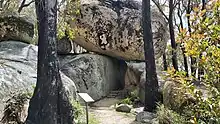| Bald Rock National Park New South Wales | |
|---|---|
 Vista from the top of Bald Rock | |
 Bald Rock National Park | |
| Nearest town or city | Tenterfield |
| Coordinates | 28°51′9″S 152°03′20″E / 28.85250°S 152.05556°E |
| Established | 1971 |
| Area | 88.83 km2 (34.3 sq mi)[1] |
| Managing authorities | NSW National Parks and Wildlife Service |
| Website | Bald Rock National Park |
| See also | Protected areas of New South Wales |
Bald Rock National Park is a national park in northern New South Wales, Australia, just north of Tenterfield on the Queensland border. The border passes over the rock on the Western side. On the other side of the border national park continues as the Girraween National Park.

The park is named after its most prominent feature, Bald Rock, which is a large granite outcrop rising 260 metres above the surrounding landscape and almost 1300 metres above sea level.[2] Measuring about 750 metres long and 500 metres wide this is the largest granite monolith in Australia.[3][4] Access to the rock is provided by a sealed road into the park and walking tracks to the summit. Two tracks are marked, a steep one up the exposed face, or an easier gradient through bushland around the back. The Bungoona Walking Track, built in 1980, goes more gently up the eastern side of Bald Rock and winds through forest. It passes through some granite boulder formations, including an arch, covered in mosses, ferns and orchids. The summit offers panoramic views of the surrounding bushland, but vegetation on top prevents a full 360° view. The views are so expansive, mountains as far north as the Queensland/New South Wales border can be seen, such as Mount Barney, Mount Lindesay and Flinders Peak, and as far south as Mount MacKenzie, south of Tenterfield.

The park is in the New England granite belt, where about 220 million years ago an episode of granite magmatism resulted in the intrusion of the Stanthorpe Adamellite into the surrounding metamorphic and sedimentary rock. Subsequent uplift and erosion of the New England Fold Belt has seen the majority of the surrounding sediments and metamorphic rocks eroded away, with the Stanthorpe Adamellite remaining due to its resistance to weathering.
For many millennia, Bald Rock functioned as a neutral territory where the three indigenous nations of the area – the Jukembal, Bundjalung, and Kamilaroi – found common ground. Serving as a natural boundary, the rock allowed for gatherings and trade between these nations, eliminating the need for them to traverse each other's lands.[2]
This regolith has created a landscape with many exposed inselbergs of granite rocks, some balancing on top of each other, or forming natural arches.

In 2019/2020, bushfires severely damaged the Bungoona walking track. The NSW Government invested $800,000 repairing and upgrading the track, including making it wheelchair-accessible. The upgrades were completes in March 2023.[4]
Just off the main road from Tenterfield to the park is Thunderbolt's Hideout, a set of caves and overhanging granite rocks. It was thought to have been used by bushranger Captain Thunderbolt. A little further along the same road are some historic World War II tank traps.
Gallery
 Western View from Bald Rock
Western View from Bald Rock Northern View from Bald Rock
Northern View from Bald Rock Eastern View from Bald Rock
Eastern View from Bald Rock Sign for walking paths and summit
Sign for walking paths and summit Sign for balancing rocks and summit
Sign for balancing rocks and summit Bald Rock Trig station and Stone Pillar
Bald Rock Trig station and Stone Pillar Metal plate with directional lines pointing to distant landmarks and views
Metal plate with directional lines pointing to distant landmarks and views
See also
- Protected areas of New South Wales
- High Conservation Value Old Growth forest
- Captain Thunderbolt's Rock
- Bald Rock National Park at the NSW National Parks and Wildlife Service
- Captain Thunderbolts Hideout at NSW Schools Country Area Program
References
- ↑ "Department of Environment Climate Change and Water Annual Report 2009-10". Annual Report. Department of Environment Climate Change and Water: 274–275. November 2010. ISSN 1838-5958.
- 1 2 "Bald Rock national Park". Visit Tenterfield. Archived from the original on 9 March 2023. Retrieved 13 August 2023.
- ↑ Reader's Digest Guide to Australian Places. Sydney: Reader's Digest.
- 1 2 "$800,000 accessibility upgrade at Bald Rock National Park complete". NSW Government. Archived from the original on 1 April 2023. Retrieved 8 June 2023.